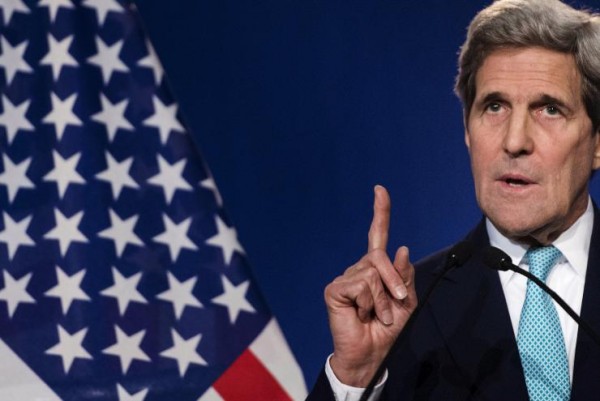 The battlefield momentum in Iraq and Syria has shifted against Islamic State, U.S. Secretary of State John Kerry said on Wednesday, but the international community must now also confront the challenge of stabilizing newly liberated areas.
The battlefield momentum in Iraq and Syria has shifted against Islamic State, U.S. Secretary of State John Kerry said on Wednesday, but the international community must now also confront the challenge of stabilizing newly liberated areas.
“The momentum has shifted,” Kerry told an international conference to raise funds for Iraq at a critical juncture in the military campaign. “The new challenge that we face is securing and aiding for the recovery of a liberated area.”
Lise Grande, the United Nations’ humanitarian coordinator for Iraq, warned that without addressing the needs of Iraqis displaced by the conflict, military victories will prove transient.
“The military campaign will have achieved a great short-term success, but perhaps little else of enduring impact,” she said.
The officials were speaking as defense and foreign ministers gathered in Washington to pledge funding for Iraq and to agree on next steps in the two-year-long fight against Islamic State, in particular the militant group’s bastion in Mosul.
Kerry said the goal was to raise at least $2 billion in new aid for Iraq to help communities get back on their feet once Islamic State militants have been driven out.
The battle for Mosul is expected to be difficult, but the aftermath could be tougher, Iraqi, United Nations and U.S. officials say. Plans are being finalized to provide urgent humanitarian aid and restore basic services and security for residents and as many as 2.4 million displaced people.
Kerry cautioned that the Shi’ite-led Iraqi government, viewed with distrust by the country’s Sunni Muslim minority, must embrace political reconciliation if Islamic State is to be defeated.
“To eliminate Daesh from Iraq permanently, the government of Baghdad has got to be viewed as responsive to the needs of the people in all parts of the country,” he said, using a derogatory Arabic term for the group.
At a press conference later, Kerry praised the government of Prime Minister Haider al-Abadi, but said: “We would like to see some reforms moving faster.”
Defense ministers of the U.S.-led coalition against Islamic State also were meeting at Joint Base Andrews outside Washington. Those talks will be followed by a joint session of foreign and defense chiefs on Thursday to discuss the broader fight against Islamic State not only in Syria and Iraq, but also in Libya and globally.
A spate of recent attacks claimed or apparently inspired by Islamic State, such as a truck attack in Nice, France, that killed 84 people last week, formed a grim backdrop to the Washington meeting.
“We are nowhere near the defeat of Daesh. It’s an octopus, it’s a snake with many heads,” said Dutch Foreign Minister Bert Koenders.
Around Mosul, the United Nations is preparing for what it says will be the largest humanitarian relief operation so far this year as terrified people stream out of the path of the advancing Iraqi military and flee from the city itself. They will need shelter, food and water, and sanitation for three to 12 months, depending on the extent of the city’s destruction.
Mosul, which Islamic State seized from a collapsing Iraqi army in June 2014, is Iraq’s second biggest city and home to a combustible mixture of Sunni Arabs, Kurds, Turkmen and others.
Officials in Erbil, the capital of Iraq’s autonomous Kurdish region, criticized the coalition on Wednesday for excluding the Kurds from the Washington gathering. Masrour Barzani, head of the regional security council, called it “a travesty” on Twitter.
Although Iraqi and U.S. officials have not announced a timetable for moving on Mosul, a senior Baghdad-based diplomat said Abadi wants to advance the start of the Mosul campaign to October after the seizure of Falluja from Islamic State last month.
The U.N. estimates that under a worst-case scenario, more than 1 million people could be displaced from Mosul and another 830,000 from a populated corridor south of the city, adding to the burden of caring for 3.5 million Iraqis already displaced.
REUTERS

Leave a Reply
You must be logged in to post a comment.